FENTANYL: A NEXT-GENERATION OPIOID CRISIS
Four students have died in one Central Texas school district alone. What should educators know about fentanyl?

WINTER 2022 | ATPE.ORG
PAGE 16
7 13 20
ATPE News Attend ATPE at the Capitol Feb. 20–21 Vouchers and the Illusion of “School Choice” Educator Shortages Across Texas: Who Is Driving This Bus?
Use your ATPE member discounts to save on everything from travel and theme parks to tickets for movies and sporting events. There has never been a more important time for savings, so head to atpe.org/member-discounts today to explore thousands of offers and products, including:
• 20%–25% off auto rentals at Alamo®, Avis®, Enterprise Rent-A-Car, and more.
• Exclusive savings from our easy-to-use Discount & Rewards Marketplace. Shop over 10,000 brands you know and love while earning 2%–20% cash back on nearly all purchases.
• Up to 65% off room rates for you and your family at over 800,000 lodging options worldwide, including VRBO.
• 30% off the everyday public web price of Lenovo’s entire product line. Take advantage of great deals on everything you need for your office and home, including all laptops, tablets, desktops, all-in-ones, workstations, and accessories.
• And many more!
atpe.org/member-discounts
Whether you are traveling or staying home for the holidays, ATPE has you covered.
’TIS THE SEASON FOR SAVINGS!
ATPE News
The official publication of the Association of Texas Professional Educators
State Officers
Stacey Ward President, Humble (4)
Jayne Serna Vice President, Leander (13)
Jason Forbis Secretary, Midway (12)
Jerrica Liggins Treasurer, Paris (8)
Karen Hames Past President, Lewisville (11)
Board of Directors
MaElena Ingram McAllen (1)
Adriane Taylor Corpus Christi (2)
Mandy Vahrenkamp Bloomington (3)
Eli Rodriguez Cypress-Fairbanks (4)
Suellen Ener Beaumont (5)
Donna Ward Willis (6)
Teresa Millard Woden (7)
Abby Rogers Paris (8)
Patti Gibbs North Central Texas College (9)
Wanda Bailey Mesquite (10)
Teri Naya Birdville (11)
Christina Flores Belton (12)
Stephanie Stoebe Round Rock (13)
Leslie Ward Merkel (14)
Betty Gail Wood-Rush Early (15)
Sherry Boyd Spearman (16)
Allyson Haveman Lubbock (17)
Gail Adlesperger Big Spring (18)
Robert Zamora Clint (19)
Laura Herrera North East (20)
ATPE News Staff
David George Editor
John Kilpper Art Director
Michael Spurlin Associate Editor
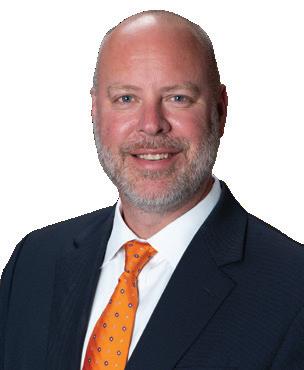
Jack Densmore Associate Editor
Jennifer Tuten Digital Editor
Marjorie Parker Contributing Designer
Kate Johanns Editorial Director
ATPE News (ISSN 0279-6260) is published quarterly in fall, winter, spring, and summer Subscription rates: for members of the association, $3 32 per year (included in membership dues); non-members, $10 per year Extra copies $1 25 each Published by the Association of Texas Professional Educators, 305 E Huntland Drive, Suite 300, Austin, TX 787523792 Periodical postage paid at Austin, Texas, and at additional mailing offices POSTMASTER: Send address changes to ATPE News, 305 E Huntland Dr , #300, Austin, TX 78752-3792 Advertising rates may be obtained by sending a written request to the above address Opinions expressed in this publication represent the attitude of the contributor whose name appears with the article and are not necessarily the official policy of ATPE ATPE reserves the right to refuse advertising contrary to its purpose Copyright 2022 in USA by the Association of Texas Professional Educators
ISSN ©ATPE 2022 0279-6260 USPS 578-050
305 E Huntland Dr , Ste 300 Austin, TX 78752-3792 (800) 777-ATPE (2873) atpe org | atpe@atpe org
Students and educators have been through a lot lately. The pandemic, the tragedy in Uvalde, the tightening of school safety procedures, and student mental health needs have all pushed student safety and well-being to the top of the priority list for educators. It seems there has never been a more difficult or more important time to focus on stu dent safety than right now. And there is so much more that we must worry about just to make sure our students are protected and ready to learn before class can even begin.
I hesitate to add something else to the list, but educators need to be aware of another important issue that is affecting our students at an alarming rate with deadly consequences. Fentanyl, an opioid 50 to 100 times more potent than her oin, is having devastating effects on students around the country.
I first heard of fentanyl and what it could do in 2018 when a friend and fel low educator lost her son to the drug. It was an unimaginable tragedy, and I witnessed the impact that it had on my friend’s family, her son’s friends, and the community. More recently, the community where I live now—just south of Austin— experienced the devastating impact of fentanyl at the start of school when several students lost their lives to this unforgiving drug.
So, what can we do? As educators, we need to know what we are dealing with, and our feature in this issue does a great job of providing a foundation of knowledge. We also need to talk to our students about the dangers of fen tanyl and how the smallest amount of the drug can be deadly. Lastly, we need to work with other leaders in our schools and communities to educate the public about the fentanyl crisis and why it is important that we act now to protect our students.
As educators, you contribute to healthy and supportive school environments and help students make positive choices. Talk to your students about fentanyl, and let’s stop this crisis in its tracks.
Shannon Holmes Ed.D. ATPE Executive Director
ATPE NEWS 3 DIRECTOR’S MESSAGE
WE NEED TO WORK WITH OTHER LEADERS IN OUR SCHOOLS AND COMMUNITIES TO EDUCATE THE PUBLIC ABOUT THE FENTANYL CRISIS AND WHY IT IS IMPORTANT THAT WE ACT NOW TO PROTECT OUR STUDENTS.
Vouchers and the Illusion of “School Choice”
Voucher proponents have long pushed for diverting taxpayer funds from an already-struggling public education system to private schools. Learn how the promise of “choice” in the matter is deceiving and, in many cases, outright false.
Fentanyl: A Next-Generation Opioid Crisis
Public health experts say that fentanyl is largely responsible for a new wave of synthetic opioid deaths. Hear the stories of families who have lost loved ones to counterfeit pills and what cartels and drug dealers are doing to target our children.

20 Educator Shortages Across Texas: Who Is Driving This Bus?
Between the growing mental strain on educators and rising cost of living, personnel shortages are becoming more and more common in schools across the state as districts look for ways to recruit and retain educators, with especially acute shortages of teachers and bus drivers.
4 ATPE NEWS ATPE NEWS On the Cover
13
16
FEATURES 16 | Fall 2022, Volume 43, Number 2
Contents
Volunteer Spotlight
Meet CLARICE CROSS, a science teacher at Schimelpfenig Middle School in Plano ISD, Region 10 ATPE vice president, and ATPE’s 2021–22 Campus Rep of the Year for local units with 1,001-plus members.

SPECIAL SECTIONS
7 ATPE at the Capitol
All ATPE members are invited to Austin Feb. 20–21 for the 2023 ATPE at the Capitol event to speak up for your profession and your students.
24 Save the Date: 2023 ATPE Summit
Mark your calendars and be prepared for adventure as we journey to Round Rock July 10–12 for the 2023 ATPE Summit.
26 In Your Neighborhood
Join us as we visit ATPE “neighborhoods” all over Texas to get an inside look at what volunteers are doing to recruit, retain, and rejoice with their fellow ATPE members.
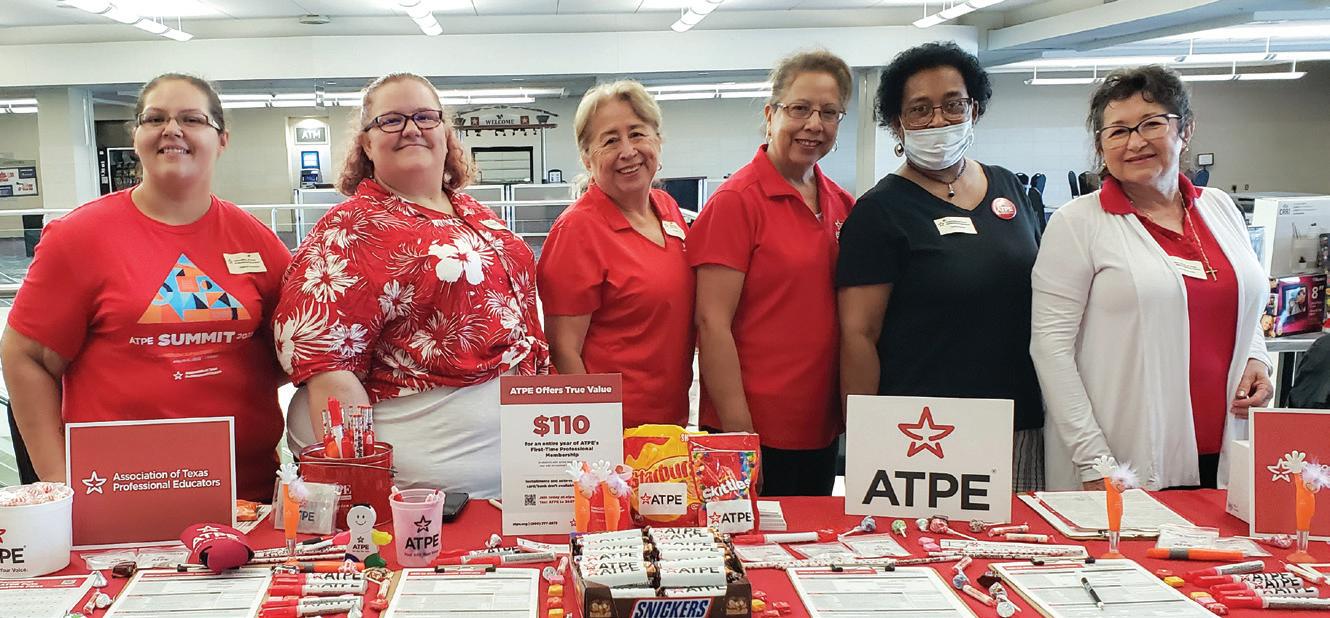
29 In Memoriam
Remembering Past State President Bill Crockett.
THE ATPE VISION
The Association of Texas Professional Educators (ATPE) supports the state’s largest community of educators who are dedicated to elevating public education in Texas.
THE ATPE MISSION
ATPE advocates for educators and delivers affordable, high-quality products and services that give members the peace of mind needed to inspire student success.
ATPE NEWS 5
© iStockphoto.com/FotografiaBasica EVERYTHING ELSE 6 Calendar 8 Regional Roundup 10 Your Ally Overworked and Overextended:
Members Turn
for Support? 11 PAC Honor Roll 12 Your Voice
28 Your
26
How Can
to ATPE
The 2022 Midterm Elections Were Certainly One for the History Books
ATPE ODP Business Solutions Program | 2023–24 Leadership ATPE Applications | ATPE Member Discount for SXSW EDU | New Additions to the ATPE Professional Learning Portal | Gen ATPE Program
DEC. 1 Awards nomination deadline


JAN. 31 Last day to join ATPE for 2022–23
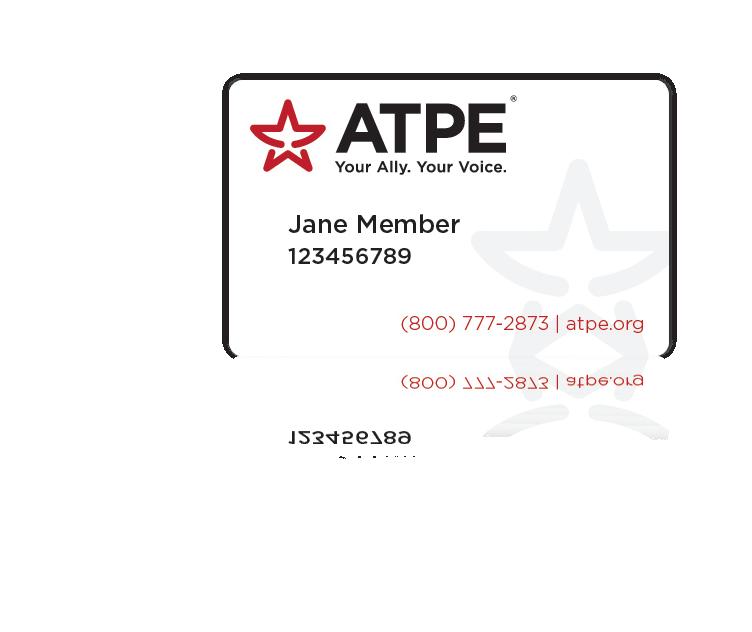

FEB. 22 School Bus Driver Appreciation Day
February


Black History Month

January
1

December

1
Nomination deadline: Charles Pickitt Educator of the Year, Floyd Trimble Local Unit of the Year, and Doug Rogers Campus Representative of the Year awards 2 Special Education Day 8–9 Teacher Retirement System Board of Trustees meeting 9 State Board for Educator Certification (SBEC) meeting Dec. 19–Jan. 2 State office closed for winter break
School Board Appreciation Month 10
First day of the 88th Legislature 16 State office closed for Martin Luther King Jr. Day Jan. 31–Feb. 3 State Board of Education meeting 31 Last day to join ATPE as a 2022–23 professional, associate, or administrator member
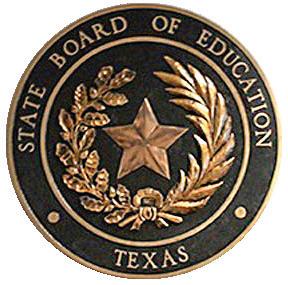
Application deadline: Charles Pickitt Educator of the Year, Floyd Trimble Local Unit of the Year, and Doug Rogers Campus Representative of the Year awards 6–10 National School Counseling Week 19–20 ATPE Board of Directors meeting (Austin) 20–21 ATPE at the Capitol 22
School Bus Driver Appreciation Day
6 ATPE NEWS CALENDAR
FEB. 20–21 AUSTIN MARRIOTT DOWNTOWN AND THE TEXAS STATE CAPITOL
ATPE.ORG/AATC © iStockphoto.com/SDI
©
Stock
Productions;
Alexandr Bognat/Adobe
FEB. 20–21, 2023









MONDAY, FEB. 20: Arrive in Austin by late afternoon to learn about ATPE’s legislative priorities and how to advocate for them most effectively with lawmakers.

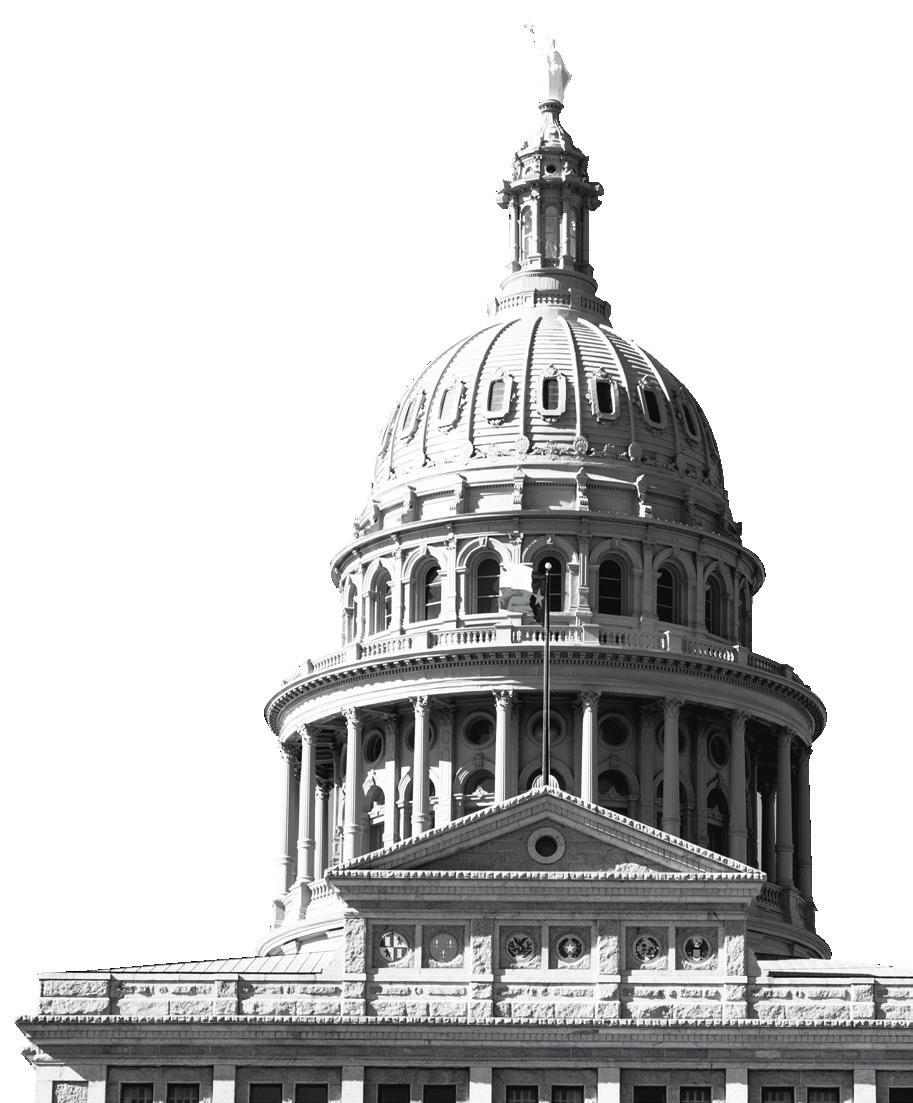
TUESDAY, FEB. 21: Fill the Capitol with ATPE red as you visit your elected officials’ offices.
Please join us for this important event and to speak up for your profession and your students.
Learn more at atpe.org/AATC.
The 88th Texas Legislature convenes Jan. 10, 2023. All ATPE members are invited to Austin Feb. 20–21 for the 2023 ATPE at the Capitol event.
LEARN MORE AND REGISTER AT ATPE.ORG/AATC
AUSTIN MARRIOTT DOWNTOWN AND THE TEXAS STATE CAPITOL
There are more than a thousand school districts in Texas and each one has success stories. Regional Roundup highlights some of the achievements happening in our public schools. When something special happens in your school district, let us know! Send news to comm@atpe.org.





































8 ATPE NEWS
exic Gulf of M
REGIONAL ROUNDUP CHAPEL HILL 2 LOCKHART 3 TYLER 5 ©2016 HEB, 16-6154 FRISCO 4 WACO 1
From Across the State HEADLINES
1 University High School Welcomes Facility Dog
In Waco ISD, a new employee has joined the University High School staff as a facility dog. His name is Bear, and he is the district’s first emotion al support animal, according to the Waco TribuneHerald. The 1-year-old sheepadoodle began his new duties over the summer boosting spirits with the cheerleading team. Waco ISD has also added a li censed professional counselor for employees who will provide social emotional education for both students and staff, according to the newspaper. wacoisd.org
2Chapel Hill ISD Conducts Pack the Bus School Supply Drive

Chapel Hill ISD partnered with local organizations to hold a Pack the Bus school supply drive to pro vide students with school supplies for the 2022-23 school year. Partner organizations with drop-off locations included Whataburger and Dairy Queen, and there was also a drop box in Chapel Hill High School during the Back2School Expo.
Louisiana co
chapelhillisd.org
3 Lockhart ISD Introduces Drive.Pair.Share Incentive
With high gas prices and more employees com muting to work, Lockhart ISD is offering a new Drive.Pair.Share program that provides a $10 per day incentive to staff members who live outside of a 10-mile radius of Lockhart ISD and carpool with other district employees to work. So far, Lockhart ISD has paid $2,420 to staff through the program. “We are really excited about the support this pro vides to our staff, especially as many of them com mute to work in our schools,” Lockhart ISD said in a statement.



lockhartisd.org
4H-E-B Donates $10,000 to Frisco ISD Foundation
The Frisco Education Foundation (FEF) ac cepted a surprise $10,000 donation from H-E-B, which will go toward agriculture and culinary arts programs that are offered at the Frisco ISD Career and Technical Education Center. The foundation serves both Frisco ISD and the Frisco area to help “enhance educational oppor tunities for FISD students.” Frisco’s Education Foundation has awarded over $9.4 million in scholarships to graduating seniors and $1 million in grants to educators since 1999.
friscoisd.org
5 Tyler ISD’s Read-a-Thon Fundraiser and Literacy Bus Brings Fun, Education

Tyler ISD’s Rice Elementary raised more than $32,000 for the annual Read-a-Thon fundraiser. The reward for the class that raised the most mon ey was the opportunity to paintball the principal. There was also a campus-wide celebration for the event. The reward for the class that read the most hours was a visit to the Literacy Bus, which offers activities and parental engagement. Lisa Muñoz’s class got to take part in several of the Literacy Bus activities, which are self-paced and include skills such as name writing, alphabet, concepts of print, sound awareness, knowledge of sound, learning and recognizing known words, and understanding complex text read aloud, according to the district website. Students also got to eat ice cream and take a book home from the Literacy Bus.
tylerisd.org
Arkansas
ATPE NEWS 9
Photos courtesy of Waco ISD, Chapel Hill ISD, Adobe Stock, HEB, and Tyler ISD
Overworked and Overextended: How Can Members Turn to ATPE for Support?
BY JENNIFER GORDON ATPE Staff Attorney

Right now, educators are sharing a common sentiment with us: They are overextend ed. Staffing shortages, burdensome extra training requirements, adjustments to sched uled hours, and more have educators spread thin. Although we cannot always address the root cause of these challenges, the ATPE Member Legal Services Department is a resource that members need to know they can call on.* Let’s discuss the most common challenges educators are reporting this year and how we can assist.
For classroom teachers, one of the most frequent inquiries we get concerns extra work outside of the scheduled workday. The state-mandated Reading Academies require many classroom teachers to work additional hours over the course of the year above and beyond their regular schedule. Far more teachers are simply being asked to stay later, come earlier, or pick up the work of two classrooms. All of these requirements can be overwhelming, and educators often want to know at what point they can object.
definition that often requires analysis and some times argumentation. ATPE attorneys are often called on to assist members with this analysis and to present arguments against the unreasonableness of a particular assignment or directive.
For paraprofessionals, administrative workers, and other hourly employees considered “nonex empt” by the FLSA, time worked over 40 hours is “overtime” and should be compensated according ly. ATPE attorneys are available to assist eligible associate members with overtime claims and other hourly pay issues.
Reassignment is another common concern this year. Professional educators and support staff are being called on to perform duties or teach classes they did not plan for and may have never anticipat
STATE-MANDATED READING ACADEMIES
CLASSROOM
ADDITIONAL HOURS OVER THE COURSE OF THE YEAR ABOVE AND BEYOND THEIR REGULAR SCHEDULE. TEACHERS ARE SIMPLY BEING ASKED TO STAY LATER, COME EARLIER, OR PICK UP THE WORK OF TWO CLASSROOMS.
We often hear members re fer to duties being assigned as beyond their “contract hours.” However, most ed ucator contracts in Texas do not state what those hours are; rather, contract language often simply requires work at “hours and dates to be set by the district.” Dates are generally specified by the board-adopted district calendar, and the expected daily hours are determined at the campus level, though some work can be required beyond the set schedule—within reason.
Although teachers are “exempt” employees under the Fair Labor Standards Act (FLSA) and thus can be expected to regularly work beyond 40 hours with out extra compensation, these “additional duties” are not without limit. The commissioner of educa tion has responded to teacher appeals in the past by setting the limit as one of “reasonableness”—a
ed. Determining whether a reassignment is lawful or allowed by an educator’s contract is a matter ATPE attorneys assist with regularly, too.
In addition to changes in their overall assign ments, some educators report being assigned du ties during their conference period. The law re quires most public school districts to provide 450 minutes of uninterrupted planning time every 10 days. We hear from many teachers who are used to being occasionally flexible about duties or meet ings during their conference time; yet, this year they are finding those demands for flexibility to be more regular than occasional. In such cases, we can assist an educator as needed to address these concerns, informally or otherwise.
*Eligibility, terms, conditions, and limitations apply. Visit atpe.org/protection to view important disclosures and current details of the insurance policy. Staff attorney services are provided separate from the Educators Professional Liability Insurance Program.
10 ATPE NEWS YOUR ALLY
continued on page 31
THE
REQUIRE MANY
TEACHERS TO WORK
Thank you for your investment in Texas public education.
The following ATPE members donated $50 or more to the ATPE Political Action Committee (ATPE-PAC) from July 1 to Sept. 30, 2022.
Abilene
Tonja Gray
Alief Barbara Lebold
Alvin Ron Fitzwater Sarah Hirsch
Amarillo Michael Renteria Jamie Ried Shane Whitten
Arlington Carole Lemonds
Austin Elizabeth Davis Axtell Christina Taylor Azle Melissa Moore Ballinger Cheryl Buchanan Darlene Kelly Beaumont Tamara Richards Big Spring Gail Adlesperger Birdville Mary Gardner Boerne
Ona Beth Day Richard Wiggins Carthage
Shannon Bush Chapel Hill Denise Bynum
Comal Calvin Greene Coleman Sarah Beal Community Wendy Smith
Connally Courtney Jones
Corpus Christi Barbara Ruiz
Corsicana Julleen Bottoms Crowley Sara Connaway Cypress-Fairbanks Eli Rodriguez Dallas
Tiea Samuel Maria Slette Mary Stricker Floyd Trimble Del Valle Cristela Rocha Denton Sharon Pritchard Dickinson Lisa Cook-Johnson Paula Marshall Edinburg
Elias Lozano Antonio Mercado El Paso Gaell Casillas Everman Steve Pokluda Falls City
Phyllis Jarzombek
Theresa Moczygemba
Ferris
Betty McCoy Frenship
Keri Henderson
Galena Park Sharon Dixon Lynn Nutt Elisabeth Shepard
Garland Nichole Gambulos
Jed Reed Georgetown Joshua Gleich Greenville Rochelle Hawkins
Hale Center Lynette Ginn Harlandale
William Grosso Hawley Tommie Hicks Desirie Ries Hays
Shawna Mayerson Hempstead Jessica McHale Leah Smith Humble James Ellis Gayle Sampley Stacey Ward
Hurst-Euless-Bedford
Lesli Bernstein Lisa Hollowell Sarah Mann Ingram
Roger Moralez
Inspired Vision Academy
Tammy Chavez-Valdez
Irving Connie Kilday Kelley Walker Jim Ned (Consolidated)
Nicole Fuller Karnes City
Virginia Boelter Melanie Mathis Cathy Stolle
Katy Ollie Kendrick Keller
Jeffery Pool David Williams Killeen Kiree Bons Joanna Trobough Melissa Walcik Ron Walcik Klein Allen Bettis Diane Hudson Paul Kirkpatrick Marsi Thomas Krum Brandi Claiborne Tanya Gray Betty Plunkett La Academia de Estrellas Deborah Pleasant La Joya Hilda Martinez Norma Vega Lake Dallas Ann Hodges
Lamesa Abigail Ramford Leander
Jennifer Bowland Phyllis Crider Mary Cathrine Dorney Jayne Serna Lewisville Karen Hames Tara Linz Maria Samantha Montano Angela Murphy Allison Shaub Magnolia Sonia Wolfrom
ATPE-PAC solicits contributions only from members, employees, and their families. Participation in ATPE-PAC is voluntary.
Mason Justin McFarland
Maypearl
Steve Baker McAllen
Twila Figueroa MaElena Ingram Belinda Rosa
McGregor Melisa Hudson Merkel Leslie Ward
Mesquite
Jennifer Grady
Kimberly Matchniff
Vickie Rabb-Wiggins Cindy Vasquez
Midland Michelle Adams Midway (12) Deborah Avants Jason Forbis Mission Maria Trevino Nacogdoches Roya Dinbali J York Katherine Whitbeck Navasota Cecelia Bates-LaCoure Susan Ambrus New Braunfels Alec Kelley New Waverly Gidget Belinoski-Bailey Nocona Traci Morrison
Northeast Texas Rebecca Lanham Stephany Reyes North Lamar Shelia Slider
Northside (20)
David de la Garza Evelyn Miles-Hoskin
Olney
Dale Lovett Becky Spurlock
Samuel Spurlock
Paris
Abby Rogers Jerrica Liggins
Pflugerville Pamela Brown-Ledet
Pharr-San Juan-Alamo Michael Sweet
Plano Caryn Bartle Collin Mehta Lindsay Robinson Dennise Schuler
Port Arthur Sandra Turner Rosebud-Lott Beverly Bredemeyer Jennifer Lorenz
Round Rock
CaRita Forte Stephanie Stoebe San Antonio Byron Hildebrand
San Isidro Veronica Lopez Sheldon Shawn Mustain Spearman Sherry Boyd Teague Gina Taylor Tyler Betty Berndt Eddie Hill Van Vleck Christie Dement Waco
Magdalena Campos Katie Forbis Maria Hernandez
Weslaco Hector Cruz Juan Guajardo Westwood Kathryn Hightower Wichita Falls Belinda Wolf Willis Angela Robinson Donna Ward Woden Malinda Holzapfel Teresa Millard
Ysleta Jennifer Adams
ATPE Staff Kelly Curtis Ginger Franks Shannon Holmes Kate Johanns Jennifer Tuten Mary Jane Waits Retired Deryl Elms Jo-Sandra Greenberg
ATPE NEWS 11 PAC HONOR ROLL
The 2022 Midterm Elections Were Certainly One for the History Books
These are statistics that should trouble ev ery Texan: In the 2022 midterm elections, 8.1 million voters cast their ballots, roughly 300,000 fewer than the number who voted in the last midterm elections in 2018. Turnout in 2022 dropped 11 points to just under 42% turnout, com pared with a 53% turnout in 2018. Turnout was the lowest since the 2014 midterm elections in which barely a third of registered Texas voters participated.
The founders of Texas knew an educated populace was essential to the preservation of the liberties and rights of the people. Moreover, they felt providing a free education was a moral obligation. That’s why they cemented into our constitution the guarantee of an efficient system of public free schools.
BY MARK WIGGINS ATPE Lobbyist
Texas set a new record with 9.6 million registered voters declining to participate in the 2022 midterm elections. Election tracker Jeff Blaylock pointed out that combined with those who are eligible but have not yet registered to vote, roughly 11 million Texans who could have voted in 2022 did not do so.
Those who did participate reelected Republican Gov. Greg Abbott, Lt. Gov. Dan Patrick, and Attorney General Ken Paxton by double-digit margins. Republicans carried every statewide office, main taining a Texas tradition dating back to the 1990s. What happens next is fairly easy to predict.
Armed with a perceived mandate, Abbott can be expected to charge full steam ahead on his campaign promise to pass a private school voucher, redirect ing desperately needed funding from rural public schools to subsidize the tuition of elite private acad emies in cities such as Dallas and Houston.
Under Patrick’s leadership, the Senate will move quickly to send a voucher bill to the House and crank up the pressure on representatives who op pose diverting Texans’ tax dollars to unaccount able private and parochial schools at the expense of the public school down the street.
Patrick has already offered to “carve out” ru ral communities in an attempt to pacify the ru ral Republicans whose school districts would be forced to subsidize vouchers for the suburban country club set. Yet this sleight of hand won’t in sulate rural districts from the fiscal consequences of even a limited voucher program.

The lieutenant governor has in the past held hostage critical legislation regarding school fund ing and educator compensation to try to force the House’s hand on a voucher bill. It is possible that we may again see important public school legisla tion held as collateral to pass a voucher bill.
Vouchers would undermine this fundamental right by dismantling the principles of free and equal access and the constitutional mandate that the Legislature make suitable provision for the support and maintenance of the public school system.
This upcoming legislative session could well de termine whether we get to keep it.
Fortunately, there is still reason for hope. Propublic education candidates fared well on Election Day, including several who campaigned on support for public schools.
These candidates will need our support in the coming months to withstand the withering pres sure that will be placed on them to betray the inter ests of the communities that elected them. Voucher supporters will also need to hear from constituents about the consequences of their vote.
That makes this year’s ATPE at the Capitol event critically important. Join your colleagues Feb. 20–21 in Austin to share your teacher voice with your elected lawmakers at the Texas Capitol. You’ll get access to legislative training and informational sessions to help you advocate effectively and effi ciently. Nothing is more impactful than a face-toface meeting! Visit atpe.org/AATC for more details. Registration will open in early December.
In addition to ATPE at the Capitol, educators can always call, email, and write letters to let our elect ed officials know we won’t stand by as our public school communities come under attack. Be sure to regularly log in to the member-only Advocacy Central page on the ATPE website for the latest contact tools and campaigns.
Our public schools are the backbones of our com munities. They are where we learn, work, gather, and pour our hopes and dreams for each future generation. We will have our work cut out for us defending them this session. We can’t do it without your teacher voice.
12 ATPE NEWS YOUR VOICE
VOUCHERS AND THE ILLUSION OF “SCHOOL CHOICE”
Voucher proponents have long pushed for diverting taxpayer funds from an already-struggling public education system to private schools. The promise of “choice” in the matter is deceiving and, in many cases, outright false.
BY JENNIFER TUTEN
The voucher push in Texas has been a decades-long battle, but to date, none of these initiatives has passed—despite staunch philosophical and financial support from statewide elected officials and various PACs.
ATPE has long opposed vouchers under our member-written-and-approved legis lative program. In addition to conventional vouchers, ATPE opposes any initiative that would direct public funds to private, home, or for-profit virtual schools.
The politicization of education, which has reached a fever pitch as of late, has vouch er proponents ready to strike yet again.
The Heritage Foundation explicitly points to political strife as an opportunity to push vouchers, stating the culture war “could be extremely helpful for promoting education scholarship accounts, tax credit schol arships, and school vouchers … School choice advocates … should not squander the opportunity to use it.”
Voucher proponents have not squan dered the opportunity, spending millions on Texas candidates this election year and—as ATPE Governmental Relations Director Jennifer Mitchell told Houston Public Media in October—using culture and curriculum debates to garner support for privatization. During a virtual discus sion with pastors from around Texas in September 2022, Lt. Gov. Dan Patrick stated: “After COVID and after [critical race theory] and after pornographic books in libraries, parents deserve choices.”
BIPARTISAN OPPOSITION
Texas’ battle with vouchers has not been fought along party lines. Historically, Democrats and rural Republicans in the Legislature have banded together to block vouchers from passing. In the 2021 legisla tive session, the majority-Republican Texas House voted 115–29 against allocating public funds toward school choice programs.
With Texas home to more rural students than any other state, siphoning funds out of public schools means rural areas would suffer the most if a voucher program were passed. Private school options are few and far between in rural Texas. According to the Texas Private School Accreditation Commission (TEPSAC), nearly 60% of Texas’ 254 counties do not have an accredited private school.
Public school districts are also many small towns’ largest employers—Lockhart, Sweetwater, Jacksonville, Canyon, Raymondville, and Azle, to name a few. As Rep. Drew Darby (R-San Angelo) tells The Texas Tribune: Independent school districts are the lifeblood of the commu nities in his West Texas district. Aware of the skepticism, Patrick is already signaling to rural lawmakers that his 2023 voucher proposal will focus on urban areas only, but that won’t eliminate the many prob lems associated with using public funds for private schools.
NATIONAL PUSH
More important than the question of availability of non-public school options
is the question of quality. Around the U.S., schools that participate in voucher programs vary in degrees of accountability. For example, in Maine, a private school whose enrollment of publicly funded students falls below 60% is not required to administer a state assessment. In Georgia and Florida, state assessments are not required except upon parental request. In Mississippi, schools participating in a vouch er program must only provide parents an annual update of a student’s progress.
Overall, voucher programs have not proven to be of significant benefit to learning outcomes. In fact, studies found achievement loss in Louisiana, Indiana, Ohio, and Washington, D.C.
Vouchers have also opened the door to financial malfeasance. In Milwaukee, nearly half of the city’s private voucher schools operating between 1991 and 2015 have closed either voluntarily or due to regulato ry action. In 2005, the Milwaukee JournalSentinel investigated a number of vouch er-funded schools, 15 years after voucher legislation was passed in Wisconsin.
Their report revealed several troubling issues. The founder of Mandella Academy for Science and Math cashed $330,000 in tuition checks received for over 200 no-show students and purchased two luxury vehicles.
At Milwaukee’s Harambee Community School, a former financial officer was charged with embezzling $750,000. Teachers’ pay checks bounced, and staff turned over at an alarming rate. A longtime school board mem ber withdrew his own son from the school.
ATPE NEWS 13
VOUCHERS BY THE NUMBERS
Of the 29 states with a voucher, tax-credit scholarship, or Education Savings account program in place, nine rank in the bottom 10 in per-pupil funding.
Both schools have since shut down.
A 2016 performance audit on Arizona’s Empowerment Scholarship Accounts Program identified a number of cases in which scholarship payments were cashed by parents who then enrolled their children in public schools.
SCHOOL “CHOICE”
The complexities of vouchers are many, and proponents with a vested interest— morally, financially, or both—often shroud the concept under the cloak of “school choice.”
The choices parents and students have in the public school system far outweigh those offered in private schools. Because TEA has no oversight over the private school system, these schools are exempt from the requirements outlined in the Texas Education Code, which enumerates parents’ rights regarding complaints, assessments, exemption of instruction, review of curriculum, and more.
On the other hand, in private schools, what does “choice” entail?
From millions to billions in three years: Voucher funding in Florida has increased from approximately $326 million in 2019 to an estimated $1.3 billion this year.
102 of 247 (41%) of Milwaukee’s private voucher schools closed between 1991 and 2015. CLOSED VOUCHER SCHOOL $326 MILLION $1.3 BILLION
Ironically, it’s the schools, not parents, that have the upper hand because they are not bound to the same regulations as public schools. In other words, taxpayers would be on the hook for financing schools that have no accountability to them in terms of quality, equity, and fiscal responsibility.
In a May 2022 interview with KXAN News, ATPE Lobbyist Mark Wiggins pointed out just a few examples: “Parents would surrender the right to run their child’s school through an elected school board, the right to view curriculum, the right to demand open records, the right to accountability scores, not to mention federal rights for a disabled child.”
in Wisconsin over a six-year period.
Students with special needs are espe cially vulnerable without the protections afforded to them by public education. Private schools are not subject to the Individuals with Disabilities Education Act (IDEA), which requires schools to provide services necessary for a child to receive a free appropriate public education (FAPE). Private schools that do not receive federal funding are also not covered under Section 504, which protects qualified individuals from disability-based discrimination.
14 ATPE NEWS
INCREASE IN COST OF VOUCHERS 2022
41% increase in amount awarded through the Indiana Choice Scholarship Program from 2021-22 to the following year. Student participation only increased 24% in that time frame. 75% of current-year voucher applicants in Arizona already attend private school. 102 of 247 PRIVATE VOUCHER SCHOOLS CLOSED 574% 2019
Because religious institutions are exempt from the Americans with Disabilities Act (ADA), religious private schools are not re quired to provide accommodations so long as they do not receive federal funding.
This lack of protection and services can lead either to a student being “counseled out” or unenrolled from the school, or the parent may opt to reenroll the child in public school when it becomes apparent their child is not receiving the support they need.
THE MONEY FOLLOWS THE STUDENT … OR DOES IT?
In May 2022, Gov. Greg Abbott touted school choice at a campaign rally in San Antonio, promising that such initiatives would have the money follow the student. It’s not that simple.
Not only would individual students and their parents suffer, but also public education as a whole would lose out. Most school funding is issued on a per-pupil basis, so every student who leaves the public school system negatively impacts a district’s revenue for operations, facilities, personnel, etc., as those costs do not decline in proportion to the decrease in enrollment.
So who benefits from vouchers, other than those with a vested financial interest? It’s suggested the wealthy would benefit the most.
In states with voucher programs, the majority offer vouchers in the amount of a private school’s tuition or the state’s per-pupil funding amount, whichever is less. In Texas, the latest figure for base funding is $6,160 per student. However, average tuition for private schools ranges from $9,000–$11,000. Parents would be responsible for the remainder, and that may not include transportation, food, textbooks, technology, or other services otherwise provided by public schools. In other words, sending your children to private school, even with a voucher, would still require significant financial means.
Furthermore, Texans could see a signifi cant hike in property taxes. In Wisconsin, the cost of vouchers has increased sixfold since 2015-16, starting at $21.4 million and
ballooning to $144 million for 2021–22. More troubling is the lack of transpar ency in allocation. In an effort to give Wisconsinites a better understanding of how their taxes are being used to fund the state’s voucher programs, lawmakers have tried passing legislation requiring an out line of voucher line items without success.
IF NOT VOUCHERS, THEN WHAT?
During the aforementioned campaign rally, Abbott also stated that he was for “fully funding our kids’ classrooms and fully supporting parents, teachers, and students,” but he did not elaborate on how that would be accomplished. Texas’ K-12 population is second in the nation behind California, but the state ranks 39th in per-pupil funding even after a significant budget increase in 2019.
One thing is clear: Instead of diverting taxpayer funds from an already-under funded public education system, it’s time to focus on what can be done to ensure successful outcomes for Texas school children. This means addressing educator recruitment and retention in a meaningful way, which is especially crucial given the mass exodus of teachers statewide. It also means improving the school finance sys tem so districts can attain the resources necessary to serve all students equitably.
WHAT’S NEXT?
Despite the multitude of failures already seen with vouchers, the push continues in Texas and beyond.
Earlier this year, the Wisconsin Legislature passed a slate of anti-public education bills, including the dissolution of Milwaukee Public Schools, creation of a “Parental Bill of Rights,” and voucher expansion with a potential tax burden of half a billion dollars. Gov. Tony Evers, a former educator and administrator, vetoed the bills.
In October, Arizona voters failed to block the expansion of a controversial voucher program after a petition fell short of the number of signatures required to put the program to a voter referendum. As of 2021, Arizona was ranked last in school
funding. The state department of educa tion reported 75% of voucher applications this year were for children who already attend private schools.
Voucher funding in Florida has outpaced public school funding and nearly tripled in the past three years, from $326 million in 2019 to an estimated $1.3 billion for the 2022–23 school year. In Leon County, voucher expenditures have increased 540% from the 2019–20 school year to the current academic year.
Back in Texas, a voucher scheme was discovered and reported by Texas Monthly in October. The article revealed the Wimberley ISD superintendent had been approached regarding a potential partner ship that would create a charter school on paper but in practice take taxpayer dollars to send students to private schools around the state. Although the students of this new charter “campus” would be counted as Wimberley ISD students, the tax dollars re ceived for their attendance would be sent to the schools they physically attended.
With Abbott and Patrick’s reelection, vouchers could very well become a reality in 2023 without exploiting loopholes in the system. Abbott has promised to sign any school choice legislation that reaches his desk. The Patrick-led Senate is almost certain to pass a voucher bill as it has done in prior sessions, but will there be enough opposition in the Texas House to keep vouchers away?
As educators, it is our responsibility to secure our futures and those of our school children by speaking out to our elected of ficials and voicing our opposition to these damaging initiatives. One of ATPE’s five legislative priorities heading into the 88th Texas Legislature in January is preventing the passage of a voucher plan.
ATPE members interested in meeting their elected officials to discuss the associ ation’s legislative priorities are encouraged to attend ATPE at the Capitol in Austin Feb. 20–21, 2023. ATPE also has a wealth of resources on Advocacy Central and TeachtheVote.org to help you get in touch with your elected officials and see where they stand on the issues.
ATPE NEWS 15 LEARN MORE ABOUT VOUCHERS IN THE U.S. BY VISITING THIS INTERACTIVE DATA VISUALIZATION: ATPE.ORG/VOUCHERS-BY-THE-NUMBERS
FENTANYL: A NEXT-GENERATION OPIOID CRISIS
 BY DAVID GEORGE
BY DAVID GEORGE
16 ATPE NEWS
For several years, you’ve likely heard the phrase “opioid crisis” in the news or on television, but for some of you, it hits very close to home. According to the Centers for Disease Control and Prevention (CDC), a new wave of synthetic opioid overdoses account ed for more than 71,000 fatalities and is up 23% from the previous year. Public health experts say that the synthetic opioid fentanyl is largely responsible for this deadly trend.

Recently, Hays CISD lost multiple students to this drug, and there is reason to believe this is just the beginning of a new and dangerous era for an opioid crisis that has shifted in focus to the younger generation.
Tim Savoy serves as the chief communi cations officer for Hays CISD. In May, the district began seeing instances of suspect ed overdoses, and one of their schools had to use an opioid overdose treatment for the first time.
“We all have known about fentanyl for a couple of years now,” Savoy says. “It’s been around, but it was always just sort of something that you heard about in other cities or other parts of the country.”
In late July, Savoy received a call from the local Justice of the Peace, who also serves as the coroner. She broke the news that Hays CISD had lost a student, and that was a suspected fentanyl overdose.
“When you have a situation like that, it’s tragic,” Savoy says. “It’s horrible because a fentanyl overdose is something that is preventable.”
A week later, the Justice of the Peace called to report another death.
“At that point you say, ‘Oh no!’” he says. “I hope that this is just a horrible coincidence. Having two so close together puts this issue directly on your radar as a school system to do something before it happens again.”
In response, the Hays CISD communica tions team decided to include information about fentanyl and the two tragic deaths of students over the summer in its back-toschool messaging. But just as they were putting together the message, the Kyle chief of police—who tracks fentanyl-relat ed incidents and deaths—alerted Savoy that this is a growing issue on which they would need to further engage students.
Savoy and his team immediately began working on a campaign to get the word out to students, but the weekend after the very first week of school, they learned that a third student had died from fentanyl in their district.
“At that point, this was no longer a trage dy or a tragic coincidence,” Savoy says. “It was now a pattern and a crisis. So we just cleared the calendars and went all-in with the messaging. We had to let people know what was going on, and we could build the campaign around and behind it afterwards.”
Hays CISD held a press conference to discuss the deaths, created posters for each of its schools, and built a webpage dedicated to providing information and resources. The webpage includes a video series, “Fighting Fentanyl,” featuring law enforcement and the families of victims.
After the press conference and the third confirmed fentanyl death, an autopsy came back from a prior death over the summer confirming it was also caused by fentanyl. That brought the death toll to four students in a six-week period.
“We adopted the mindset that we have rightfully put a lot of effort and energy into information and awareness concerning the pandemic and hardening our school perimeters,” Savoy says. “But this is also a huge threat, and it deserves our attention and energy as well. We do have the power to reach people and to bring awareness. In the education setting, we are uniquely equipped with the ability to get the word directly to parents and students in our district.”
A SINGLE MISTAKE
In early 2018, Wyndi Padgett and her husband Mical lost their son to a synthetic opioid poisoning at the age of 21. Blain was a fun-loving, “brighten up the room” kind of person who loved football and listen ing to old country music. Growing up, he wanted nothing more than to play college football like his father. Blain worked hard to earn a scholarship to Rice and was over joyed to begin fulfilling his dream.
The previous fall, Blain suffered a shoul der injury during a game that required sur gery. His injury kept him off the field and unable to work out with the team. Blain was anxious to return, and his recovery was going well.
“In January, the Rice football team hired all new coaches, and Blain had not been released yet to work out,” Padgett says. “The day before he died, we talked to him, and he was so excited about the next day.
Blain had just been released from the doc tor to return to the field, and I remember him saying, ‘I feel good. I am going to work out tomorrow and show these coaches what I’ve got.’”
That night, Blain got a pill from an ex-teammate at Rice that he thought was a hydrocodone. An autopsy would later show that Carfentanil, an analog of fen tanyl commonly used to tranquilize large animals, was found in his system.
“It took us three months to get the cause of death back because they weren’t looking for Carfentanil,” Padgett says. “They had never even heard of it in a human.”
By all accounts, Blain was not a drug user, nor was he addicted to pain pills. The pill he received from his former teammate contained a lethal dose of synthetic opioid. Within hours of taking it, Blain was gone.
“When we talked to him that night, he was happy,” his mother recalls. “He was laughing about things and talking about the next day. That weekend, we were going to see him in Houston. We were taking his sisters and planning this great weekend we could all spend together.”
The following afternoon, Padgett re ceived a call from her husband.
“Wyndi, I’m headed to Houston,” she recalls her husband saying. “They can’t find Blain.”
ATPE NEWS 17
— Wyndi Padgett
“It’s not the sort of mistake that you can learn from. It’s two milligrams, and you don’t get a second chance to make the right choice.”
Blain had missed morning practice, and his father had received a concerned call from one of Blain’s teammates.
He immediately called the police and had Blain’s roommate let them into their off-campus house. On his way to Houston, he received the heartbreaking news: Blain was gone. He turned around and drove home to pick up his wife and their daugh ters from school before heading back to Houston.
“They would not let us see Blain,” Padgett says. “They had already taken him out of the house, and I guess they didn’t have to have us identify him because his room mate was there. At the time, I thought it was terrible that they wouldn’t let us see him, but now I don’t have that memory.
“My last memory of him was smiling and happy, so I’m really thankful that we didn’t get there in time,” she says. “That evening, the entire football team showed up at Blain’s house, and we all just cried and talked about Blain through the night.”
After reviewing Blain’s phone, the police informed the Padgett family that they found a text from Blain to his trainer at the university asking for a hydrocodone prescription. The trainer replied that they could talk to the team doctor that week, but Blain made the fateful decision to instead go through a former teammate.
“We always wondered if it was because Blain thought that if the doctor knew that he was still in pain, he might not release him to play,” Padgett says. “I think Blain felt like he didn’t want the coaches to know that he was still hurting, so he went a different route.”
Tragically, that single decision cost Blain his life.
BRINGING THE DANGER TO LIGHT
Fentanyl is a synthetically produced opioid that is up to 100 times stronger than morphine or heroin, and it presents a unique threat.

“My husband and I have been trying to get the word out because four-and-a-half years ago, when my son died, we had never even heard of anybody dying from a single pill,” Wyndi Padgett says.
Leslie Inman lost her daughter, Marissa, to fentanyl poisoning in 2016.
“Marissa took a pill that had a lethal dose of fentanyl in it,” Inman says. “She had no
way of knowing how dangerous it was. She had two small children. One of them was five and a half, and the other one was just under a year.”
Annie Hernandez lost her son Joshua Bell in 2019 to fentanyl poisoning. She believes a Xanax laced with fentanyl killed him. Together, Inman and Hernandez have partnered with the families of four other victims of fentanyl poisoning to form the Travis County Overdose Prevention Endeavor, whose primary focus is edu cating the public on the dangers of drugs including fentanyl.
“Neither Leslie nor I knew of fentanyl when we first got the tox screen back for our children,” Hernandez says. “But since then, we are becoming experts on it. Fentanyl has been around since the ’80s. It’s used mainly for surgeries and end-oflife cancer patients. It was never intended to be used for chronic pain, and it is cer tainly not intended to be used outside of a hospital setting.”
There is a huge difference between the fentanyl you get from a pharmacy and the illicit fentanyl—its chemical precursor— that travels from China by boat to Mexico, where it is processed and pressed into all kinds of pills or mixed with other drugs, such as cocaine or heroin.
“They mix fentanyl into absolutely everything,” Hernandez says. “It’s cheap, and they don’t have to grow poppy seeds. They don’t have to go all over the world looking for XYZ. It can be done in some one’s backyard or basement, and it’s a game-changer.”
Counterfeit pills are popping up all over the state, disguised as everything from painkillers to stimulants. In 2021, almost 1,700 Texans died from synthetic opioid poisonings alone.
Both the cartels and drug dealers pro ducing these pills use fentanyl because it is incredibly potent and increasingly cheaper to acquire. Unfortunately, this arrange ment also makes potential overdoses much more likely.
“You could have a bag of 50 pills, and only two of them contain a lethal dose of fentanyl,” Inman says. “If you take the one that has just a little too much fentanyl— called a hot pill—you won’t know until you’re overdosing or dead.”
According to the United States Drug Enforcement Administration (DEA), a dose of as little as 2 milligrams can be lethal.
“You could get five of these fake pills that are made in somebody’s garage, and one pill could only have one milligram in it,” Padgett says. “You take it, and everything is fine. You take another one that has three milligrams in it, and you die.”
POISONING OUR CHILDREN
These fentanyl-laced pills can be pressed to look exactly like prescription opioids, but there is zero oversight into the levels of fentany that pills can contain, even within the same batch. Although it might seem like bad business to endanger your own customers, these illicit manufacturers are not concerned with creating a safe product.
“They make so much money off these pills that they don’t need to care if it is killing their clients,” Inman says. “They literally don’t need land, water, fertilizer, seeds, or someone to mind the crops. They just need the chemicals, a basement, and a chemist. I’m not even talking about a professional chemist—just someone who can mix it up and make it into a pressed pill. Because it’s so cheap, they could kill half of their customers and still make more money than they ever could before.”
But the problem doesn’t stop there. More recently, the DEA reports that chil dren have become a new target market for the cartels.
“They’re going after kids now with ‘rain bow’ fentanyl,” Hernandez says. “It is the scariest thing I’ve ever seen. It’s like a box of Cap’n Crunch cereal. That’s what the fentanyl looks like. Why would you even make it that color unless you’re targeting children? They call them Sweet Tarts and Skittles.”
“They’re going after kids now with ‘rainbow’ fentanyl. It is the scariest thing I’ve ever seen.”
18 ATPE NEWS
— Annie Hernandez
“It’s not something you have to light up or inject in your vein,” Inman says. “It is literally a little pill that can be made to look like candy and can kill.”
With the rise of fentanyl products disguised as prescription pills and even candy, the language surrounding deadly encounters with the drug needs an update.
“The phrase ‘fentanyl overdose’ indicates that someone intended to take fentanyl and they took too many,” Savoy says. “But in the cases where people don’t know they’re ingesting fentanyl, it should really be seen and referred to as a poisoning.”
As drug dealers explore new avenues for pushing these deadly products, social media platforms are becoming a hotbed for illegal transactions.
“The dealers infiltrate kids’ Snapchat to sell drugs using emojis as secret codes,” Hernandez says. “For example, Xanax could be a ‘yellow school bus.’ There’s this huge list of drugs they offer and will ship directly to any address.”
Much like ordering food to be delivered straight to your doorstep, children now have access to drugs without ever leaving their homes.
“The drugs used to come directly from China through the mail,” Inman says. “Now, they’re coming through the cartels, but you can still get it through the mail. This way, you don’t have to go down to the street corner. It has completely changed the way people are getting their drugs.”
A POSSIBLE ANTIDOTE
“People are poisoning pills, and it’s killing our kids,” Padgett says. “It’s different than the way our Red Ribbon Week has ap proached drugs in the past. I’d like to figure out a way to focus it more on what our kids are dealing with now.”
After decades of similar messaging, families of fentanyl poisoning victims are looking for a renewed approach to keeping children away from drugs.
“Yes, we don’t want them to do cocaine or heroin,” Padgett says. “We don’t want them to try those dangerous drugs, but they also need to worry about other deadly situations. Pills are more dangerous than ever. They need to know to never take any pills that were not prescribed to them by their doctor.”
As the discussion about prevention continues to make headway, another conversation has begun regarding the FDA-approved opioid overdose treatment of naloxone—commonly referred to by its first official brand name, Narcan.
“One of the things that we’re trying to do is bring awareness to the fact that there are life-saving drugs that can help reverse the effects of an overdose,” Inman says. “I carry Narcan with me all the time now because even though I don’t do drugs, you never know when someone might over dose in front of you.”
But some districts across Texas do not have any form of naloxone treatments available in their campuses.
“I went to my local district nurse trying to get Narcan into the schools,” Hernandez says. “She tried to tell me the side effects of Narcan. I said: ‘Oh, you mean life? What side effects?’ If somebody is overdosing at a school, you have to wait for 911 to come, and if you have no idea what they took, that child could die.”
Different forms of naloxone come in a nasal spray that can instantly, but tem porarily, reverse the effects of an opioid overdose. And with fentanyl poisonings on the rise, there is a growing need for greater availability.
“We want to get the word out that there is this drug that can help save somebody’s life,” Inman says. “Without it, you just stop breathing, and you die. That’s what happened to my daughter. She took a pill, she laid down, she stopped breathing, and she died.”
Although Narcan—for a period of time—can reverse the effects of an opioid overdose, the victim can quickly slip back into a life-threatening condition if they do not receive additional medical treatment right away. Even in an ambulance on the way to the hospital, a naloxone drip is often required.
In Hays CISD, school nurses at all levels began carrying Narcan at the beginning of the last school year, and school resource
officers began carrying it a couple of years prior. Savoy believes the best way for districts and communities to address this problem is to be both proactive and straightforward.
“Some people don’t want to sound the alarm if they’re embarrassed by some thing,” he says. “Well, there’s no embar rassment here. We just deal with reality. We deal with the fact that what’s happen ing is happening, and we need to address it head-on.”
Although it is true most drug overdose and poisoning incidents do not occur at schools, Savoy says that schools still have an integral part to play in both prevention and treatment.

“I don’t understand why you wouldn’t have Narcan available,” Savoy says. “I mean, you have Band-Aids in case some body cuts their finger. I know that’s not the same caliber, but why would you not have something available if you know it’s lifesaving? We’ve had a defibrillator in our central office here for 15 to 20 years, and I’m not aware of any time we’ve ever had to use it. But it’s great to know it’s there in case we need it.”
Hays CISD tracks how many times Narcan has been used on campuses. Since May, district officials have already had to administer Narcan three times at three different schools.
“If the nurse carries Narcan, it is not going to have any iota of an effect on whether kids are going to use a drug or not on campus,” Savoy says. “What it will do is allow you to potentially save a child’s life who’s fading out in front of you and going into fentanyl coma right before they die.”
In all of the four cases of opioid overdos es and poisonings in Hays CISD, multiple doses of Narcan had to be administered. continued on page 31
ATPE NEWS 19
“The phrase ‘fentanyl overdose’ indicates that someone intended to take fentanyl and they took too many. But in the cases where people don’t know they’re ingesting fentanyl, it should really be seen and referred to as a poisoning.”
— Tim Savoy, Chief communications officer, Hays CISD
WHO IS DRIVING THIS BUS?

BY JACK DENSMORE
 An increase in cost of living, inflation, effects on mental health, and a feeling of loss of respect for the profession has caused many teachers and education staff to leave either the public school system or Texas altogether. In response, districts are trying creative ways to tackle the resulting shortages, including incentives, efforts to ease the strain on employees, and ways to retain education staff.
An increase in cost of living, inflation, effects on mental health, and a feeling of loss of respect for the profession has caused many teachers and education staff to leave either the public school system or Texas altogether. In response, districts are trying creative ways to tackle the resulting shortages, including incentives, efforts to ease the strain on employees, and ways to retain education staff.


EDUCATOR SHORTAGES ACROSS TEXAS: 20 ATPE NEWS
Although public education has been approaching a teacher shortage for years, with specific certification areas already experiencing shortages, the COVID-19 pandemic sped up the process, and now, shortages in employees are regularly in the news cycle in Texas and across the country.

Dr. Ray Perryman, president and CEO of The Perryman Group, discussed with the Texas Teacher Retirement System board the rising concern of teacher shortages, as re ported by Texas Education News
Perryman reported that Texas will need to fill 50,000 teacher vacancies every 10 years. This is on top of a Charles Butt Foundation survey that says 77% of teachers surveyed have seriously considered leaving the profes sion in Texas. Often, the feedback displayed that not enough pay, support, and/or respect were the main reasons for leaving. This also includes non-instructional work and having to provide support for individual students without the necessary resources to do so, ac cording to Texas Education News.


There are a multitude of reasons teachers are leaving the profession. According to a survey from Teachers Pay Teachers, which corroborates much of the Charles Butt Foundation survey, 65% of teachers say that respect for teachers has lessened over the

past two years. The same survey also shows 59% of teachers believe the restrictions on teaching certain issues or curriculum have had a definite impact on teachers leaving— while 29% say it has had an impact to a de gree. Teachers Pay Teachers also broke down the data by region, with 70% of teachers in the southern U.S. stating there was less re spect for teachers.

The shortages go beyond classroom teach ers to support personnel. In Lake Travis ISD, students who live outside a two-mile radius of their school will have a bus service that rotates every other week, meaning the stu dents will go without service half the time. Even though Lake Travis ISD has raised the starting salary for bus drivers to $23 per hour, the shortage continues.
COST OF LIVING
The cost of living is a major contributor to the educator shortage. Both rent and house prices continue to climb, especially in urban and suburban areas across Texas.
According to SoFi and the Bureau of Economic Analysis, the average cost of liv ing in Texas was $39,661 per year in 2020. Although Lake Travis ISD’s raise for bus drivers would cover this average, not every district has the funding available for such measures. Plus, this average does not speak to every financial situation. Home prices have also risen, in September of 2021, Zillow reported the average home price in Austin was $520,898. Teachers with families in the
ATPE NEWS 21
Austin area must have other means to pay with these types of prices, leave the area and commute, or move to apartment complexes, where the rent is also high:
• Texas median two-bedroom rent: $1,083
• Texas median three-bedroom rent: $1,268
• Texas median four-bedroom rent: $1,641
The above rent prices are reflected on a median for the en tire state based on 2019 U.S. Census data—cities like Austin and Dallas typically have higher rates.
To fight a higher cost of living, raising employee pay or pro viding incentives is often necessary. Much like Lake Travis ISD, Bryan ISD also raised the pay for its staff in 2019. Bus driver pay was raised to $18 an hour, and teachers received an increase that varied based on experience. The largest increase was for teachers with 35-plus years of experience (an $8,100 annual bonus). Special education aides also received an increase of up to $3,000.
learning in whatever form their districts put togeth er—teachers were lauded as heroes as they tried their best to finish the year,” Bell says. “Then, as soon as the summer of 2020 ended, and teachers expressed concern for their own health and safety going back fully in person, suddenly teachers were seen as lazy, and peo ple said they just did not want to work. [We went] from hero to villain in the blink of an eye.”
REPORT SCHOOL’S TRANSPORTATION OPERATIONS ARE LIMITED DUE TO BUS DRIVER SHORTAGES.
78%
REPORT BUS DRIVER SHORTAGES NEGATIVELY IMPACT DISTRICT TRAVEL OPERATIONS.
DeSoto ISD also has a few incentives for both new and returning staff. These in clude one-time incentives and ongoing incentives. The one-time incentives include a $500 employee referral bonus and a $500 DeSoto alumni bonus. It is also the last year for what is called a “Difference Maker Bonus,” a $3,000 bonus, which is for paraprofessional and auxil iary staff only. Ongoing incentives include up to $29,000 for teachers who earn designations in the prior year under the state’s Teacher Incentive Allotment and a $5,000 incentive for Master Teachers, according to the DeSoto ISD website.
When asked what districts can do to retain teachers, former Texas high school teacher Danielle Bell says: “For one, they can pay us, and pay us what we’re worth.”
Bell taught high school for 20 years. She started in Texas for four years, before moving to Arkansas, Oklahoma, and New York. She worked back in Texas for the last 12 years and has worked in six different districts across the state. The last district she worked for was Lamar CISD for five years. Now, Bell works as an adjunct English professor and is a doctoral student in educational studies at the University of Northern Colorado.
Although Bell spent a long time teaching in public educa tion, the mental toll it took became too much to handle.
THE MENTAL STRAIN ON TEACHERS
Beyond compensation, there is still more to the story. In particular, the emotional and mental health of teachers has been a major contributing factor in recent departures.
“I think now, the difference is that during the lockdowns and the early months of COVID, when all of the students were at home—with their parents trying to navigate online
For Bell, no amount of money would have made her stay in the public teaching profession. This is largely due to the uncertainty and emotional impact of returning to the class room after COVID-19 closures had lifted.
“The return in the fall of 2020 was the most difficult ‘back to school,’ and it exacerbated every emotion and stressor and magnified how bad it really was,” she says. “Teachers had to decide if they kept the classroom doors open and made them selves vulnerable to an intruder, or if they kept them closed and thus did not have the ventilation to mitigate exposure.”
One of the many reasons Bell left Texas public education was due to these emotional stressors.
“My decision to leave was not an easy one,” she says. “I felt immense guilt—I felt like a failure—I felt like I was let ting my former colleagues, my students, and my community down. But I also felt like I had to leave for my own sanity and mental health.”
Districts are looking for different ways to both recruit and retain teachers. Houston ISD implemented an 11% average raise for returning teachers for the start of the 2022-23 school year, and starting teachers receive a starting salary of $61,500.
“[It is] one of the most competitive starting salaries in the nation,” Houston ISD said in a statement. “We continue holding job fairs and hiring events, partnering with colleges and universities in and beyond Texas, and welcoming in ternational candidates with certification to teach in critical shortage areas. Where necessary, we seek certified long-term substitutes to fill in where a vacancy is not filled by the first day of school.”
SHORTAGE OF BUS DRIVERS
Bus driver shortages have also grown worse. According to a national survey by HopSkipDrive, 88% of respondents said their school’s transportation services were constrained by a shortage of bus drivers. The top reason for the shortage, according to 67.16% of respondents, was difficulty recruiting new bus drivers.
For now, districts are about 50/50 when it comes to reduc ing transportation services because of the shortage—55.22%
22 ATPE NEWS
88%
have not reduced transportation, while 44.78% have. The main reduction in transportation services comes in the form of fewer bus routes with around 60% of respondents reporting this. Other options include decreasing the range buses operate, which has students walking farther, or chang ing bell times.
The survey also identifies a correlation between access to transportation and attendance—with 67% of respondents stating this and 61% reporting chronic absences within their district.
However, the biggest data point is that 94% of respondents state they have a staffing shortage within their district. These shortages include teachers, school bus drivers, custodians, health professionals, librarians, and administration.
In order to help with the situation, the Texas Department of Public Safety announced a waiver for select commercial driv er licenses (CDL). This waiver expired in March 2022, but it allowed the waiver of the “under the hood” engine training covered by the Federal Motor Carrier Safety Administration (FMCSA).
Lake Travis ISD is among the many school districts hit hard by the shortages. Brad Bailey, Lake Travis ISD assistant superintendent for operations/Title IX coordinator , sum marized the situation: “When it comes to recruiting, Lake Travis is often hitting a wall. The main bump in the road is the timeliness with which bus drivers are looking for jobs. It takes about six weeks to become certified to drive a school bus in Texas, but most bus drivers are looking to start the next week or the same week upon being hired.”
In the state of Texas, school bus drivers must obtain a Texas Commercial Driver License-Class B with a school bus en dorsement and pass a DOT physical and drug test, a state li cense check and criminal background check, and a 20-hour school bus certification course. On top of that, they must be CPR-certified and have a good driving record.
However, another issue Lake Travis has run into is retention.
“We hire someone for a couple of weeks or a month, and they’re like, ‘oh this is not for me,’” Bailey says. “And the ones we’ve lost, some have left for family, to leave to be in a differ ent area, or to go into private industry and make a lot more money doing different things.”
Lake Travis has also experimented with earlier drop-offs for parents to provide an additional option for weeks when the bus does not service their route.
“We have opened our campuses up at seven o’clock in the morning for early drop-offs,” Bailey says. “That seemed to help a lot with families who can drop off, then go to work.”
Bailey says the main thing he asks the community to do is spread the word about the open positions.
“It just comes down to trying to recruit drivers,” he says. “We’ll interview everybody, and if they meet the criteria for the position, then obviously we want them to join our team. We train everyone in house, so if they have not driven a bus
before, they don’t have to go downtown or anywhere else to drive a bus. We have a program in place here.”
Shortages are not just occurring in big districts but in the smaller districts as well. Teresa Millard, a bus driver in a small district and who represents Region 7 on the ATPE Board of Directors, explained that substitute bus drivers are becoming increasingly hard to find.
“We do not have anyone that is ‘just a bus sub,’” she says. “Our sub drivers consist of coaches and (agriculture) teach ers. We had to add two bus routes and extend one route due to the addition of the neighboring district. We had employees working to obtain their certification over the summer to fill these new positions and re place one driver that retired.”
Millard also discussed the issue of pay for the bus driv ers within her district.
“We have also had some questions among drivers over the fact that the new routes are paying more per route be cause they are a little longer,” Millard says. “But we were not given the option to switch to a higher paying route.”
The issue of paid time off has had a huge impact as well, es pecially on female employees.
94%
“We receive five paid days off to match the five we receive in our other district positions,” Millard explains. “The only difference is that those five days do not roll over from year to year. So, we have a hard time finding subs if we do want to use our days—but if we don’t use them, we lose them. This has been especially detrimental to some of our female bus driv ers who had days saved in their teaching position for when they needed to take maternity leave.”
Districts across the state and country have looked at all these aspects to retain and recruit teachers. Stipends, in centives, and raises in salary are some of the most common ways districts have tried to tackle the staffing shortages, but there are also the unfavored options including increasing workload on teachers.
Some districts are adopting four-day work weeks with positive results. Time will tell if this solution finds its way to larger districts and if the same results are seen in larger populations. But for small districts facing their own staffing shortages, the four-day work week has been a viable option.
Be sure to check out the digital version of the magazine to read a bonus section about one of the staffing strategies school districts are adopting: four-day school weeks.
ATPE NEWS 23
REPORT A STAFFING SHORTAGE IN THEIR DISTRICT.
Statistics from HopSkipDrive’s 2022 State of School Transportation report available at www.hopskipdrive.com/blog/6-key-takeaways-from-the-state-of-school-transportation-2022-report
• Use your educator voice during the ATPE House of Delegates, when delegates will approve ATPE’s legislative program and elect the 2023–24 state officers.
• Celebrate the educational and leadership accomplishments of outstanding ATPE members.
• Expand your mind during professional learning and volunteer training sessions.
• Discover the fun and excitement Kalahari has to offer, including America’s largest indoor waterpark, themed escape rooms, and 80,000 square feet of attractions and activities at Tom Foolery’s Adventure Park!

Join us as we journey to Round Rock in search of new ATPE adventures.
2023 CHOOSE YOUR OWN ADVENTURE Kalahari Resorts and Conventions Round Rock | July 10–12, 2023
atpesummit.org
Mark your calendars for July 10–12. Details coming this spring at
!
ATPE Has Your Back
As an educator today, we know you are spread thin. With so much on your plate and your time and energy spent facing a multitude of challenges, ATPE wants you to know that we are here to support you. With the support of our affordable, high-quality legal resources, you can spend less time worrying about what could happen and more time focusing on your students’ success.
ATPE professional liability insurance policy* highlights include:
• Up to $8 million per insured member per occurrence, subject to aggregate limits of $2 million per insured per occurrence for violations of students’ civil rights and up to $500,000 per insured for bodily injury/ property damage claims.
• Up to $20,000 aggregate per insured for employment rights defense with a $10,000 per claim limit, win or lose.
• Up to $10,000 per claim and aggregate per insured for successful appeals beyond the school board or commissioner of education.
• Additional $5,000 per claim and $10,000 aggregate per insured for favorable-outcome certification and termination claims.
• Up to $15,000 aggregate for criminal defense.
• Up to $5,000 per claim for bail bond reimbursement per insured.

In addition to the above insured benefits, eligible ATPE members have access to a team of staff attorneys who may help with job-related legal concerns.** The ATPE Member Legal Services Department retains more staff attorneys than any other Texas educators’ association. Our legal team may provide eligible members with quick, confidential assistance with employment-related legal concerns—in English or Spanish—at no additional cost. You can arrange an after-hours call if it’s inconvenient to speak during regular business hours.
View the details of the professional liability insurance policy at atpe.org/protection
For assistance, members must call (800) 777-2873. For more information, visit atpe.org/protection.
atpe.org/protection
*The Educators Professional Liability Insurance Policy is underwritten by the National Union Fire Insurance Company of Pittsburgh, PA., with $5.66 billion in net surplus and more than $21.9 billion in total admitted assets as of Dec. 31, 2021. The insurer may not be subject to all insurance laws and regulations of this state. The foregoing notice is provided pursuant to Texas Insurance Code Article 21.54. ALL COVERAGE IS SUBJECT TO THE EXPRESS TERMS OF THE MASTER LIABILITY INSURANCE POLICY ISSUED TO ATPE AND KEPT ON FILE AT THE ATPE STATE OFFICE. Coverage applies to an insured’s activities within his/her professional capacity and does not apply to activities that predate the coverage period. View the complete details of the insurance policy at atpe.org/protection. Eligibility for ATPE membership benefits is contingent upon ATPE’s receipt of the annual membership dues amount for your appropriate membership category. A disruption in payments to an authorized payment plan may result in discontinuation of such benefits, including cancellation of insurance coverage for the entire membership year retroactive to Aug. 1 or your membership date. ATPE reserves the right to determine eligibility for the appropriate membership category. The membership year runs from Aug. 1–July 31. **Staff attorney services are provided separate from the Educators Professional Liability Insurance Program.
ATPE invites you to join us as we visit “neighborhoods” all over Texas. Get an inside look at what ATPE volunteers across the state are doing to recruit, retain, and rejoice with their fellow ATPE members!



In Your Neighborhood: ATPE Stories from Your Communities
26 ATPE NEWS
Waco ATPE

Waco ATPE volunteers attended the Waco ISD new-teacher orientation (NTO) to recruit new mem bers and even provide a free breakfast for the educators in attendance.

University of Houston–Downtown ATPE

University of Houston–Downtown ATPE college student and student teacher mem bers volunteered at the Moody Gardens Art in the Gardens event benefiting students with special needs.

Region 20 ATPE
Region 20 ATPE held its fall social event at Bowl and Barrel in San Antonio. Longtime ATPE members in attendance were joined by many new faces in the ATPE family.
Keller ATPE
Keller ATPE members set up an informa tion table at their district’s NTO to let new educators know about the many benefits of ATPE membership.

ATPE NEWS 27
Important News About Your Discount on Classroom Supplies

The ATPE Office Depot® Member Benefits Program, previously Office Depot Business Solutions Division, has been rebranded to ODP Business Solutions.
This exciting evolution allows for ODP Business Solutions to be more agile and innovative. Take advantage of the ATPE ODP Business Solutions Program to transform your classroom for the holidays.
Here’s how you can maximize your ODP Business Solutions™ member benefits:
Register for an Account Online
To continue to receive your member discounts, you’ll need to re-enroll or register for an account through our dedicated ODP site.
Huge Savings
Using your registered account and ordering online is the best way to take advantage of your full member discounts.
You’ll receive savings of up to 75% on the Best Value List of preferred products with free next-business-day delivery* or in-store and curbside pickup.**
Print and Copy Services
You can also place print services orders online and have them delivered where and when you need them. Or available for pickup at an Office Depot® or Office Max® Store.
*Free Delivery: Minimum purchase required after discounts and before taxes. Orders outside our local de livery area and most furniture, oversized, bulk items, cases of bottled water and other beverages and special-order items do not qualify. Non-qualifying orders incur a delivery charge (minimum charge of $9.99). Many orders can be delivered next business day (between 8:30 AM and 5:00 PM) if placed online or via phone by 3:00 PM or via fax by 1:00 PM, local time (In most locations). Other restrictions apply. **Curbside pickup is available in most stores, subject to state and local regulations. Orders must be placed 1 hour before store closing.
New Additions to the ATPE Professional Learning Portal
Over 40 sessions from SXSW EDU 2022 are now available as part of your membership through the ATPE Professional Learning Portal on the ATPE website. The ATPE Professional Learning Portal tracks any CPE hours you earn, making it easy when it is time to renew your certificate.

Sessions range from 15 minutes to one hour and feature a multitude of different speakers across the education spectrum. They include:
• The Tyranny of Low Expectations: Ableism in EDU
• Reimagining Education with Students at the Center
• How Can We Save Teacher Professional Development?
• Career Readiness in America: An Inaugural Report
• Building Advocacy and Classroom Connection
• Bringing Joy Back to Learning
• The Intersection of Informal & Formal Learning
• Searching for Meaning: The Future of EdTech Talent
Access them for free by logging in to your ATPE account, navigating to the “In The Classroom” tab, and clicking on Professional Development.
28 ATPE NEWS YOUR ATPE
In Memoriam:
TPE Past State President Bill CroCkett
ATPE is saddened to share news of the passing of Past State President Bill Crockett on Oct. 23, 2022. Crockett was the founding board chairman of the Texas Professional Educators (TPE), which merged with the Association of Texas Educators (ATE) in 1980 to form ATPE. TPE and ATE were both formed by Texas educators seeking an independent, nonunion professional association following the 1976 unification of the Texas State Teachers Association (TSTA) with the National Education Association (NEA), a labor union.
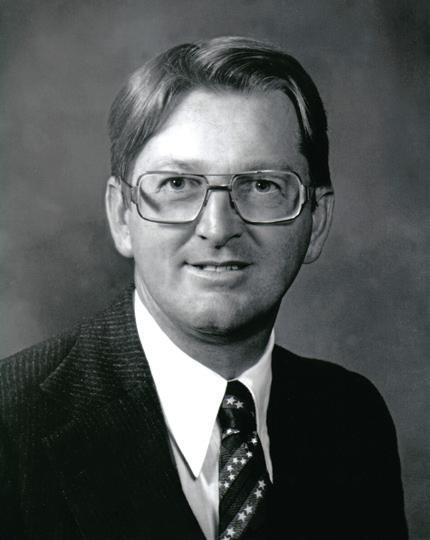
Born June 22, 1939, in Gregg County, Texas, Crockett’s initial plans to pursue a law degree went by the wayside when he became, as he wrote in an unpublished memoir, “hooked on teaching!” after his history teacher asked him to plan and teach a lesson in his place while he attended a meeting. While pursuing his teaching degree, Crockett was elected president of the University of Houston Student Education Association, the largest such student association in both Texas and the United States. As president of UH-SEA, Crockett was disheartened by the National Education Association’s move toward unionism and began a lifetime of activism in the national right-towork movement, particularly among public educators. Following the controversial vote unifying TSTA with NEA, Crockett and his wife Ann joined with likeminded educators in the Houston area to form TPE. At the same time, educators in the Dallas area were form ing ATE.
An educator in both Houston and Katy ISDs, Crockett was appointed by Gov. Dolph Briscoe to the Teachers’ Professional Practices Commission of Texas, which adopted the Educators’ Code of Ethics. Crockett advised numerous nonunion educator associations across the U.S.
Three years ago, the Crocketts relocated from Houston to Terlingua, where their daughter, Rachel, teaches and is an ATPE member. The association and its predecessor TPE have always been a part of her life. “It was something he and my mom started at our kitchen table,” she recalls.
In his writings, Crockett shared: “My motto has been, ‘You only live once, so do all of the good that you can.’”
ATPE extends its sympathies to the Crockett family and friends.
ATPE Member Discount for SXSW EDU

ATPE and SXSW EDU are once again partnering to provide ATPE members with a discounted rate of up to 50% off the walk-up rate for SXSW EDU 2023 and SXSW badges.
SXSW EDU 2023 will take place March 6–9 and features four days of compelling sessions, indepth workshops, engaging learning experiences, mentorship, film screenings, startup events, policy discussions, competitions, exhibition, networking, and so much more.

As an added benefit, many of these sessions qualify for CPE credit, redeemable through the ATPE Professional Learning Portal!
We’re excited to help as many ATPE members attend SXSW EDU as possible, and we encourage you to take advantage of this benefit. There is no minimum, maximum, or immediate purchase nec essary, but you must be an active ATPE member.
To receive your discounted rate, complete the request form at atpe.org/SXSW (login required). Instructions for redeeming this exclusive ATPE member benefit will be listed in the description.
To take advantage of this offer, eligible ATPE members should complete the form no later than Feb. 24, 2023.
For questions about logging in to your member account on the ATPE website, contact members@ atpe.org or call (800) 777-2873.
ATPE NEWS 29 YOUR ATPE
Photo by Tico Mendoza
2023-24 Leadership ATPE Applications Will Open in Early 2023
Leadership ATPE is a dynamic one-year program that offers valuable profes sional development, leadership training, and networking opportunities for profes sionals who are (relatively) new to the education field and our association.
This year-long educational program focuses on the skills that emerging leaders need to best serve their schools and communities, pursue leadership roles within ATPE, and advance their careers—including public speaking and presentation skills, strategic thinking practices, building connections, enhancing interpersonal communication, advocacy, and more.
Participants will attend two expense-paid weekend learning retreats in Austin, network with their colleagues throughout the year, and be recognized during the ATPE Summit.
Learn more about the program and how to apply! atpe.org/Leadership-ATPE
Age 30 or Younger? Don’t Miss Out on Gen ATPE
One of ATPE’s newest programs, Gen ATPE, offers special programming and networking opportunities specifically for educators ages 30 or younger. No additional application or fee is required, but to receive notification of Gen ATPE events, your member profile must include your birthdate indicating that you are currently age 30 or younger. To add your birthdate, log in to your Member Account at atpe.org, then navigate to “My Profile.” Add your birthday under “Profile Information,” and click Save!
United States Postal Service Statement of Ownership, Management and Circulation
1. Publication Title: ATPE News
2. Publication Number: 578-050
3. Filing Date: Sept. 20, 2022
4. Issue Frequency: Quarterly (Fall, Winter, Spring, Summer)
5. Number of Issues Published Annually: 4
6. Annual Subscription Price: $10.00
7. Complete Mailing Address of Known Office of Publication: 305 E. Huntland Drive, Suite 300, Austin (Travis), Texas 78752-3792
Contact Person: Katherine Johanns Telephone: (512) 467-0071
8. Complete Mailing Address of Head quarters or General Business Office or Publisher: 305 E. Huntland Drive, Suite 300, Austin (Travis), Texas 78752-3792
9. Full Names and Complete Mailing Addresses of Publisher, Editor and Managing Editor:
Publisher: Shannon Holmes, 305 E. Huntland Drive, Suite 300, Austin (Travis), Texas 78752-3792
Editor: Katherine Johanns, 305 E. Hunt land Drive, Suite 300, Austin (Travis), Texas 78752-3792
Managing Editor: David George, 305 E. Huntland Drive, Suite 300, Austin (Travis), Texas 78752-3792
10. Owner: Association of Texas Professional Educators, 305 E. Huntland Drive, Suite 300, Austin (Travis), Texas 78752-3792
11. Known Bondholders, Mortgagees and Other Security Holders Owning or Holding 1 Percent or More of Total Amount of Bonds, Mortgages or Other Securities: None
12. Tax Status: The purpose, function
and nonprofit status of this organiza tion and the exempt status for federal income tax purposes Has Not Changed During Preceding 12 Months.
13. Publication Title: ATPE News
14. Issue Date for Circulation Data
Below: Fall 2022 (Aug. 19, 2022)
15. Extent and Nature of Circulation Average No. Copies Each Issue During Preceding 12 Months
a. Total Number of Copies: 67,621
b. Paid Circulation
(1) Mailed Outside-County Paid Subscriptions Stated on PS Form 3541: 64,181
(2) Mailed In-County Paid Subscriptions Stated on PS Form 3541: 0
(3) Paid Distribution Outside the Mails Including Sales Through Dealers and Carriers, Street Vendors, Counter Sales and Other Paid Distribution Outside USPS: 0
(4) Paid Distribution by Other Classes of Mail Through the USPS: 0
c. Total Paid Distribution: 64,181
d. Free or Nominal Rate Distribution
(1) Free or Nominal Rate OutsideCounty Copies included on PS Form 3541: 1,439
(2) Free or Nominal Rate In-County Copies Included on PS Form 3541: 0
(3) Free or Nominal Rate Copies Mailed at Other Classes Through the USPS: 1,668
(4) Free or Nominal Rate
Distribution Outside the Mail: 23
e. Total Free or Nominal Rate Distribution: 3,130
f. Total Distribution: 67,311
g. Copies not Distributed: 310 h. Total: 67,621
i. Percent Paid: 76.76%
No. Copies of Single Issue Published Nearest to Filing Date
a. Total Number of Copies: 4,110
b. Paid Circulation
(1) Mailed Outside-County Paid Subscriptions Stated on PS Form 3541: 670 (2) Mailed In-County Paid Subscriptions Stated on PS Form 3541: 0
(3) Paid Distribution Outside the Mails Including Sales Through Dealers and Carriers, Street Vendors, Counter Sales and Other Paid Distribution Outside USPS: 0 (4) Paid Distribution by Other Classes of Mail Through the USPS: 0
c. Total Paid Distribution: 670
d. Free or Nominal Rate Distribution
(1) Free or Nominal Rate OutsideCounty Copies included on PS Form 3541: 1,440
(2) Free or Nominal Rate In-County Copies Included on PS Form 3541: 0
(3) Free or Nominal Rate Copies Mailed at Other Classes Through the USPS: 1,674 (4) Free or Nominal Rate
Distribution Outside the Mail: 5
e. Total Free or Nominal Rate Distribution: 3,119
f. Total Distribution: 3,789 g. Copies not Distributed: 321 h. Total: 4,110
i. Percent Paid: 17.68%
16. Electronic Copy Circulation
Average No. Copies Each Issue During Preceding 12 Months
a. Paid Electronic Copies: 15,798
b. Total Paid Print Copies + Paid Electronic Copies: 79,979
c. Total Print Distribution + Paid Electronic Copies: 83,109
d. Percent Paid (Both Print & Electronic Copies): 96.18%
No. Copies of Single Issue Published Nearest to Filing Date
a. Paid Electronic Copies: 63,192
b. Total Paid Print Copies + Paid
Electronic Copies: 63,862
c. Total Print Distribution + Paid Electronic Copies: 66,981
d. Percent Paid (Both Print & Electronic Copies): 95.34%
I certify that 50% of all my distributed copies (electronic and print) are paid above a nominal price.
17. Publication of Statement of Own ership: Required. Will be printed in the Winter 2022 (Nov. 25, 2022) issue of this publication.
18. Signature and Date: Katherine Johanns, Marketing and Com munications Director, Sept. 20, 2022
I certify that all information furnished in this form is true and complete. I under stand that anyone who furnishes false or misleading information on this form or who omits materials or information requested on the form may be subject to criminal sanctions (including fines and imprisonment) and/or civil sanc tions (including civil penalties).
30 ATPE NEWS YOUR ATPE
continued from page 10—Your Ally
Another issue often reported this year involves class size. Oversized classes of any grade level put additional strain on the learning environ ment and on teachers. Texas law sets specific class-size limits—a maximum of 22 students to one teacher—for pre-K through fourth grade classrooms only, yet even in these grades, there are legal exceptions that ATPE attorneys can assist in identifying or ruling out.

Lastly, we hear some educators ask: “What are the options for leaving?” When medical reasons prompt the question, we can provide information about available types of leave and assist members in the process of getting approved for it. For educators with contracts—teachers, counselors, librari ans, administrators, and other certified professionals—who are considering a resignation, Texas law sets a deadline for resigning unilaterally at 45 days before the start of the school year. After that deadline passes, educators must seek district approval to resign or be faced with a report to the State Board for Educator Certification that can result in sanctions—typ ically, a suspended certification. ATPE attorneys are here to help members understand the considerations involved in re signing midyear when circumstances necessitate it.
For educators fighting to stay in their profession through the unique challenges of the present year, the ATPE Member Legal Services team is passionate about providing the support of the law whenever we can.
The legal information provided here is accurate as of the date of publication. It is provided here for informative purposes only. Individual legal situations vary greatly, and readers needing individual legal advice should consult directly with an attorney. Please note: Rights based on the Texas Education Code may not apply to all. Many Texas Education Code provisions do not apply to public charter schools, and public school districts may have opted out of individual provisions through a District of Innovation plan. Eligible ATPE members may contact the ATPE Member Legal Services Department.
continued from page 19—Fentanyl
“Without this lifesaving treatment, we would have had four more deaths because they would not have made it to the hospital,” Savoy says.
GETTING OUT THE MESSAGE
Anti-drug campaigns that have helped inform families and protect children for decades now face an increasingly diffi cult set of challenges. Today, kids are bombarded with ads and clickbait videos all fighting for their attention in an al ready-crowded information space. In addition, this new wave of synthetic opioid products is potentially more deadly and accessible than ever for your average youth.

“I’m going to be speaking at our high school with the DEA agent who worked on Blain’s case for Red Ribbon Week,” Padgett says. “I also plan on talking to the elementary kids. I

don’t think they’re too young. I don’t have to talk about death necessarily, but they need to hear: ‘Don’t ever take a pill. If somebody says here, try this candy, don’t take it.’”
Drug poisoning and death can be difficult subjects to broach with young children, but when their lives are at risk, informa tion is the key to their safety.
“I want parents and kids to realize that you don’t have to be addicted to drugs or be a regular drug user to die from a poisoning,” Padgett says. “You can be a normal, healthy kid and make a mistake. Blain made that mistake, and it killed him. It’s not the sort of mistake that you can learn from. It’s two milligrams, and you don’t get a second chance to make the right choice.”
Inman and Hernandez are busy working on an overdose awareness event for Travis County in August 2023, and they are urging their local representatives to officially make Aug. 31 Overdose Awareness Day. After her daughter’s death, Inman feels as though she has a social responsibility to tell everyone with kids to talk to them about the dangers of pills and never assume they will make the right decision on their own.
“There’s a huge stigma that we need to overcome,” Inman says. “And it is a big problem because when you tell somebody that they need to warn their kids about drugs, they say, ‘I will never have to worry about that because I’m a good parent.’ Well, you know what? I wasn’t a great parent, but I wasn’t a horrible parent either. And my daughter overdosed.”
Getting the message through to children has always been a tall order for parents and educators, and they can use all the help that they can get.
“Kids will listen to other kids before they listen to us,” Hernandez says. “Either we get them in school, or we get them on social media where they spend so much of their time and attention. Because we are not going to get through to them with the 9 o’clock news.”
ATPE NEWS 31
DO YOU ENJOY PODCASTS DURING YOUR COMMUTE?
out the latest episodes of both The President’s Podcast and The ATPE Podcast on your favorite podcast apps to stay up to date on public education news and issues that are important to you.
the latest on association happenings
log in
you prefer watching a
Check
For
from ATPE State President Stacey Ward,
to our member-only podcast at atpe.org/the-presidents-podcast If
video, The ATPE Podcast is publicly available to all educators and can also be found on our YouTube channel at youtube.com/officialatpe
REGIONAL MEMBERSHIP SPECIALISTS
ATPE’s
ROGER GUTIERREZ
Regions 1 & 2 rgutierrez@atpe.org
CYNTHIA VILLALOVOS
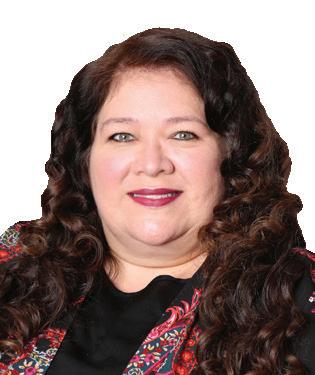
Regions 3 & 4 cvillalovos@atpe.org
GINGER FRANKS
Regions 5–7 gfranks@atpe.org

JOSEPH CRUZ
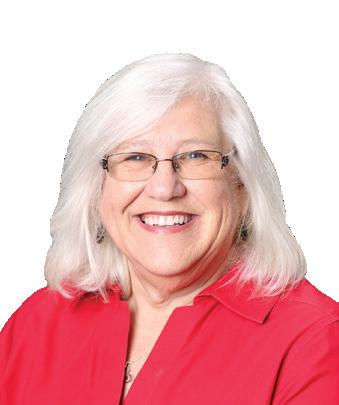
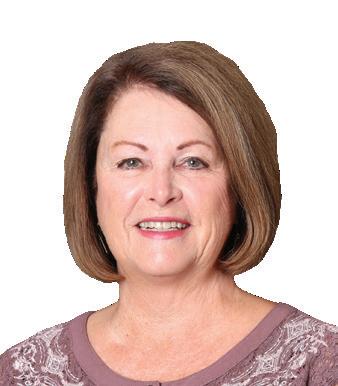
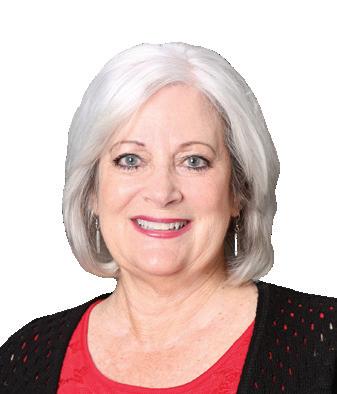

Regions 8 & 10 jcruz@atpe.org
DIANE POKLUDA
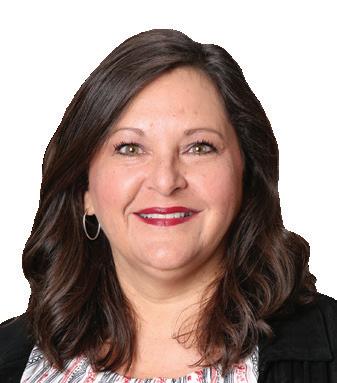
Regions 9 & 11 dpokluda@atpe.org
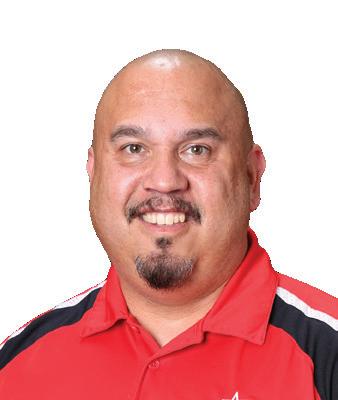
MARY JANE WAITS
Regions 12, 14, & 15 mjwaits@atpe.org
JEFF VEGA
Regions 16–19 jvega@atpe.org
YVETTE MILNER
Regions 13 & 20 ymilner@atpe.org
YOUR ATPE
eight dedicated regional membership specialists support ATPE’s members and volunteers in their local communities across the state. Not sure what region you’re in? Visit atpe.org/find-atpe to find out.
32 ATPE NEWS
Meet ATPE’s
A Shiny Quarter for Your Peace of Mind

Have You Considered the Value of Your ATPE Membership?
We’re all feeling the squeeze on our paychecks, but the benefits of ATPE membership are too important to go without. And when you break down the cost of your 2022-23 membership, these benefits are available to you for between 25 cents to 62 cents a day, depending on your membership category.*

Calculate the per-day cost of your ATPE membership at atpe.org/calculator … and remember, your peace of mind is invaluable.
*Per-day costs cited here do not include optional local unit dues, where available, or optional contributions to the ATPE Political Action Committee (ATPE-PAC). Eligibility, terms, conditions, and limitations apply. Visit atpe.org/protection to view important disclosures and current program details. Staff attorney services are provided separate from the Educators Professional Liability Insurance Program.
ATPE membership year begins 8/1/22 & ends 7/31/23. Some benefits’ effective dates may not match effective membership dates. Visit atpe.org for disclosure details/limitations. I understand that ATPE may contact me via information provided on this application, including email and text, to communicate about my benefits/account. ATPE dues are not deductible as charitable contributions for income tax purposes but may be deductible as misc. itemized deductions, subject to IRS restrictions. Approx. 95% of your dues dollar is considered deductible; 4.8% is used for lobbying activities and is therefore not
Student Teacher, College Student, and Public members may join online at atpe.org Professional, Associate, and Administrator memberships will not be accepted after Jan. 31, 2023. See atpe.org/member-categories for category descriptions. ATPE | 305 E. Huntland Dr., Ste. 300 | Austin, TX 78752 How to Submit Your Application Mail the entire application to: 2022–23 Professional, Associate, and Administrator memberships will not be accepted after Jan. 31, 2023.* I authorize ISD to deduct membership dues and donations. I further authorize ATPE to notify the ISD of changes in the amount of my annual dues and the ISD to deduct the new amounts. If my employment with the ISD ends, I authorize any unpaid balance to be deducted from my final check. This authorization for deductions is effective until I give notice to the ISD that I want to revoke it. STEP 3 Payroll Deduction Authorization Printed Name Signature Employee ID Date STEP 1 Personal Information Birthdate (MM/DD/YY) Home phone (optional) Campus Name (first, middle, last) ATPE member ID (optional) ISD Cell phone (required) Personal email (required) Campus email (optional) Mailing address State Last 4 digits of SSN Employee ID number City ZIP Recruited by Other Male Female Professional (teacher, counselor, etc.) $175 Associate (para-educator, aide, support staff, etc.) $90 Administrator (principal, superintendent, etc.) ........... $225 Retired ........................................ $10 ATPE Local Unit Dues Support ATPE in your local school district. ATPE-PAC Suggested Donation ............ Make a voluntary donation to our political action committee. $ $ 12 $ OPTIONAL: Invest in Education TOTAL I wish to cancel deduction of membership dues for: TX AFT TCTA TSTA UEA Other Last 4 digits of SSN Total Amount Total # of Deductions $ STEP 2 Membership Category (select one) & Invest in Education Or hand-deliver it to an authorized ATPE representative. Faxed or scanned applications are not accepted. Print: First Name Last Name *ISD payroll offices may stop accepting payroll authorizations before Jan. 31, 2023. Yes, contact me about becoming a volunteer! I get paid Monthly Bi-weekly $ Installment payments & auto-renew available for credit card/bank draft at atpe.org
DESIGNATED ATPE REPS Received Date Print Name Signature ATPE Membership Application 2022–23
deductible.
The thousands of ATPE volunteers across Texas are the backbone of this association. Their hard work and dedication allow ATPE to serve the state’s largest community of educators. In this ongoing ATPE News series, we spotlight volunteers who set a great example of service to their fellow educators.
NEXT UP: CLARICE CROSS at Schimelpfenig Middle School in Plano ISD, Region 10 ATPE vice president, and ATPE’s 2021-22 Campus Rep of the Year for local units with 1,001-plus members.
BENEFITS OF VOLUNTEERING
Like many ATPE members, Cross first joined ATPE as a new educator at the urging of a mentor. But it was not until after she had to contact ATPE for legal assistance that she began to investigate the other benefits of membership.

“ATPE helped me through the issue I was having with the administration, and then I begin to wonder, what other benefits come with my dues?” Cross recalls. “So I began to get more involved with my local unit, going to the meetings and social events.”
Cross credits her involvement with ATPE for bolstering her leadership skills. She was selected for the Leadership ATPE program and has since become a campus rep and vice president of Region 10 ATPE. Her volunteerism has also helped her develop relationships with her colleagues, even the ones who are not members of ATPE.
“When I came to Schimelpfenig, it was the COVID year,” Cross says. “So every one was in their classrooms. No one was talking to each other. I felt so isolated. But I was a campus rep, so I was like, ‘I want people to know about ATPE.’ That really motivated me to begin talking to my co-workers and get to know them.”
KEYS TO RECRUITING SUCCESS
When Cross is recruiting, she tries to emphasize the many benefits beyond profes sional liability insurance coverage* that make being an ATPE member so rewarding for her.
“This year I asked our principal for a little bit of time at one of the beginning-of-theyear meetings and put together a Google slide,” Cross says. “It had information about the insurance but also answers to the question, ‘Why should I join ATPE?’
I got a lot of positive feedback from that slide because people said they didn’t know about those discounts or the service projects. I also showed pictures from the ATPE Summit and different social events that we’ve had here. I showed how ATPE has expanded my network, and we actually had new members join. There were even some who joined who were part of another association.”
Cross doesn’t limit her recruiting to official presentations. From posting about ATPE discounts and events on display boards in faculty lounge areas, to sharing candy and ATPE information in her colleagues’ mail boxes, Cross is always looking for an opportunity to share the benefits of ATPE membership. She believes in trying different avenues to recruit new members.
“I just try to find different creative ways to bring people in, whether it’s through prizes or just verbal ly talking to them,” Cross says. “Just like students have different learning styles, everyone has different things that pull them in.”
*Eligibility, terms, conditions, and limitations apply. Visit atpe.org/protection separate from the Educators Professional Liability Insurance Program.
VOLUNTEER SPOTLIGHT
305 E. Huntland Dr., Ste. 300 Austin, TX 78752-3792


























































































To Fully Support Student Success, Get to the Heart of Their Struggles






Understanding that students come to you with whole life stories that may impact academic performance or behavior can help you guide them to positive choices and positive outcomes. Our resources on social-emotional learning (SEL) and wellness can help you:

























♥ Gain ef cient and effective ways to integrate SEL, language, and literacy development into all subjects and grade levels







♥ Empower students to make school a source of meaning, vitality, and community
♥ Learn how to develop trusting and positive relationships with students and their families
♥ Address the academic and SEL needs of your diverse learners
36 ATPE NEWS
Association of Texas Professional Educators
ORDER TODAY SolutionTree.com/ Support






























































 BY DAVID GEORGE
BY DAVID GEORGE




 An increase in cost of living, inflation, effects on mental health, and a feeling of loss of respect for the profession has caused many teachers and education staff to leave either the public school system or Texas altogether. In response, districts are trying creative ways to tackle the resulting shortages, including incentives, efforts to ease the strain on employees, and ways to retain education staff.
An increase in cost of living, inflation, effects on mental health, and a feeling of loss of respect for the profession has caused many teachers and education staff to leave either the public school system or Texas altogether. In response, districts are trying creative ways to tackle the resulting shortages, including incentives, efforts to ease the strain on employees, and ways to retain education staff.































































































































































